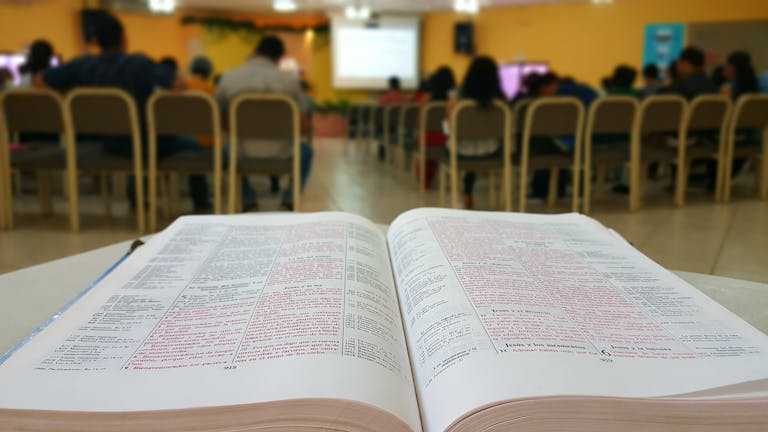Impaired Speech in Silence
Impaired Speech in Silence: God Remembers, is Abundance, & Is Gracious
An Advent Reflection by Mark Pickens, ADN Field Associate
“He asked for a writing tablet and wrote, His Name is John. And all of them were amazed. Immediately his mouth was opened and his tongue freed, and he began to speak, praising God.” (Luke 1: 63-64, NRSV)
The Gospel of Luke precedes the birth of Jesus with the birth of John the Baptist. According to Jewish law, custom, and tradition, newborn infant boys were to be named eight days after their birth and were to honor their fathers by being named after them. This may not have been a bad idea. After all, John’s father, Zechariah was a priest in the hill country of Judea and as a dedicated religious leader of the faith, his name was very important in Judaic Tradition. It means, “God Remembers.” This name and meaning along with the name of Elizabeth, Zechariah’s wife and John’s mother (meaning, “God is an oath” or “God is Abundance”) has certain and specific historic significance to this couple in the New Testament story as well as the faith narrative of the Church as we celebrate The season of Advent, the coming of the promised Messiah and Christ the Lord.
Earlier in Luke, Chapter one, we are introduced to Zechariah and Elizabeth (vs. 5-7). Zechariah was a priest who belonged to the priestly order of Abijah and Elizabeth was a descendant of Aaron. They were a couple who lived righteous and blameless lives before God and followed the commandments and regulations of their faith tradition. However, they had no children because Elizabeth was found to be barren and they were growing older and advanced in years.
The story then tells of Zechariah and Elizabeth in Jerusalem. They had come to worship with other believers. Zechariah was serving as priest before God, and his section of Judea was on duty. Zechariah was chosen by lot according to the custom of the priesthood to enter the sanctuary of the Lord and offer incense. While offering incense, an angel appeared with a message from God for Zechariah. Upon hearing the angel’s words not to fear, but to rejoice because God has heard Zechariah’s prayer, Elizabeth will conceive and bear a son, who is to be named “John.” The Angel Gabriel goes on to tell Zechariah a prophetic vision for the child and his mission that is in preparation of the chosen savior of Israel.
The scripture text indicates that Zechariah’s doubt of Gabriel’s prophecy resulted in his inability to speak until John was born. Upon reading this advent scripture I’ve often questioned. Was Zechariah truly inquiring out of doubt or unbelief; or could it also be out of cultural context and custom of requesting a sign or a human expression of God’s Divine presence, promise, and provision? that may at times, been perceived to be above and beyond human imagination? How would Zechariah’s inquiry relate to one made by you or me? Would we have asked a similar question? Regardless, of varying degrees of thought or perspective, I suggest that Zechariah’s impairment of not being able to speak has human social and theological implications that stretches further than the individual person. It is also important to note that following Zechariah’s departure from the temple sanctuary, he presented to the worshipping assembly outside that he had seen a vision. It was unclear, but Zechariah motioned to them and when his time of service ended, he returned home with Elizabeth.
The text that follows their return home, tells of Elizabeth’s conception and the months that took place in seclusion. It is a season of their lives in which this devout couple find God’s favor upon them amidst social disgrace.
While scriptural interpretation and tradition have taught a perspective of discipline or punishment for a lack of faith or unbelief, I suggest that Zechariah’s temporary impairment of not being able to speak may serve as a sign or symbolize God’s Word to God’s people being silenced for a long period of time. That silence, however, is about to be transformed into speech and songs of praise. Zechariah’s Vision of God’s Messenger was unique and yet, not so in Judaic Religious History. Many prophets and leaders of Israel were called and commissioned by God in similar contexts of worship and service. Zechariah’s Vision was therefore, very familiar and yet perhaps, unfamiliar in the awareness that God was not only faithful in hearing the prayers of he and Elizabeth for a child, but also for a Chosen People who had prayed for centuries, believing and not believing God’s Word of a Promised Messiah, who would come to serve and bring forth God’s Kingdom. Zechariah and Elizabeth were being chosen and called as the parents of John the Baptist, “The Voice of One Crying in the Wilderness, Prepare the Way for The LORD.”
Zechariah’s name, “God Remembers” is reflected back to him by Gabriel in the temple. While God in a sense, remained silent to Israel for a long time, God was aware of their circumstances and cries for salvation, liberation, redemption, and transformation. God’s call to Zechariah was and is a word to him and to us that God does remember and through the reflection of Elizabeth, God is about to provide more abundantly than what we can ever imagine at this time in our lives. Zechariah’s words that were written down at his son’s Naming were, “His Name is John.” In other words, Zechariah was proclaiming the message through “incarnate poetry, “God is Good and Gracious.” These are the words spoken by a man, serving as a religious faith leader in Judea; once impaired through a human sign of difference and now healed through God’s holy promise fulfilled to him through word and deed. Zechariah testifies to the Truth of his own name, “God Remembers” and the Truth of God’s Word to him about his son, “God is Good and Gracious.” May this Advent lead us to anticipate and observe once again with great expectation the message of God Remembering God’s People, God’s Promises, and God’s Provision through the Incarnation made full in Christ, Our Lord and King; The Messiah, Long-Awaited Has Come!
The Main Scripture Text for this Advent Reflection came from The Gospel of Luke 1: 5-25; 59-79.





